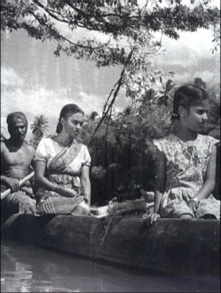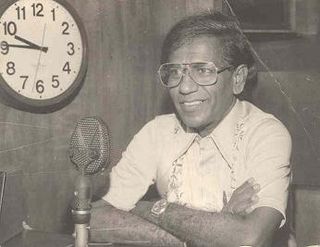Related Research Articles

Daisy Rasammah Daniels, known popularly as Rukmani Devi was a Sri Lankan film actress and singer who was often acclaimed as "The Nightingale of Sri Lanka". She made it to the silver screen via the stage and had acted in close to 100 films at the time of her death. Having an equal passion for singing as well as a melodious voice, she was Sri Lanka's foremost female singer in the gramophone era. After her death, she was awarded the Sarasaviya 'Rana Thisara'- Life Time Achievement Award at the 1979 Sarasaviya Awards Festival.

Sri Lankan cinema encompasses the Sri Lankan film industry. It is a fledgling industry that has struggled to find a footing since its inauguration in 1947 with Kadawunu Poronduwa produced by S. M. Nayagam of Chitra Kala Movietone. Sri Lankan films are usually made in Sinhala and Tamil, the dominant languages of the country.

Rekava is a 1956 film based on village life and mythical beliefs in Sri Lanka. It is the first Sinhala film fully shot in Ceylon and was film shot outdoors in the country. It was also the first Sri Lankan film that was free from Indian influence. Many Sinhala films in that time were remakes of South Indian films and were not adapted to the Sri Lankan context, even having unnatural dialog.

Sujatha is a 1953 Sri Lankan romantic musical film based on the Bollywood film Bari Behen. It was the most successful Sri Lankan film made up to that time.

Dharmadasa Walpola (1927–1983) was the most prominent Sri Lankan male playback singer of the 1950s and 1960s. Walpola was an accomplished musician adapt at playing the flute, harmonium, violin and tabla.

Chitrananda Abeysekera (1930–1992) was a veteran broadcaster, poet, writer and an administrator. He joined Sri Lanka Broadcasting Corporation, then Radio Ceylon as a radio announcer and retired as the Director of Sinhala Services in 1989. He was also the President of Aganuwara Tharuna Kavi Samajaya for more than a decade and initiated a lot of programs that benefited poets and the public alike. He restarted Kavi Suwanda, the poetry newspaper for poets. Chitrananda dedicated his whole life to Sinhala poetry and literature, not forgetting Radio Journalism.
Sikuru Tharuwa is a 1963 Sri Lankan drama directed by L. S. Ramachandran and written by P. K. D. Seneviratne. It was developed by the Kurulu Rana group that attempted to make original movies pertaining to Sinhalese culture.
Ramaya Muttusamy was a prolific Sri Lankan music director and singer. He handled the music for most of K. Gunaratnam's productions.
Dheewarayo is a 1964 Sri Lankan Sinhala drama film directed by M. Masthan and produced by K. Gunaratnam. It stars Gamini Fonseka and Sandhya Kumari in lead roles with Vijitha Mallika and Hugo Fernando in supportive roles. Music for the film is done by M. K. Rocksamy.
Prema Tharangaya is a 1953 Sri Lankan film directed by A. B. Rajj and produced by S. M. Nayagam. The film stars Aruna Shanthi and Ayesha Weerakoon in lead roles along with Hugo Fernando, Mark Samaranayake and Laddie Ranasinghe in supportive roles. Music was directed by R. Muttusamy. The musician Dharmadasa Walpola debuted as a playback singer in this film.
Eda Rae is a 1953 Sri Lankan film directed by Shanthi Kumar Seneviratne and Produced by Sisil Disanayaka. The film stars Sita Jayawardena and Herbie Seneviratne in lead roles whereas Shanthi Kumar, Premnath Moraes and Wanshawathi Daulagala made supporting roles. The music was directed by Mohammed Gauss.
Heendeniya Vidanaralalage Punya Heendeniya, popularly as Punya Heendeniya, is a former Sri Lankan cinema actress who resides in England.

Sisira Senaratne, was a Sri Lankan singer and lyricist also worked as a playback singer in Sinhala cinema. A career spanned for more than six decades, Senaratne has sung several popular songs Olu Nelum Neliya, Seeta Diyareli, Nuhuru Nupuruda, Mage Puthuta Mal, and Gaya Geethayan Game. He along with wife Indrani Wijebandara played a pivotal role in ushering in a new era in Sinhala music in the 1950s.
Deshamanya Matharage Rita Genevieve Fernando, better known by her stage name Latha Walpola, is a Sri Lankan singer. Her fans refer to her as "The Nightingale of Sri Lanka"
George Rathnawali Kumarasiri Miguel [Sinhala]), popularly as Rathnawali Kekunawela, was an actress in Sri Lankan cinema, theater and television. One of the earliest pillars in Sri Lankan radio drama history, Kekunawela had a career spanned for more than six decades. She is better known as "Muwan Palesse Menike" due to popular radio play.
Sri Lanka cinema family is the largest artistic family tree known in the world spanning over a sixty years in the Sinhala film industry. Many members of the family, both direct biological descendants and those married into the family, have had prolific careers as actors, film directors, producers, singers, scriptwriters, journalists and lyricists which included more than six generations at present.

Kanagasabai Gunaratnam, popularly known as K. Gunaratnam was a prolific film producer in Sri Lankan cinema. Started his film producing career during post-independent Ceylon, Gunaratnam is the pioneer to establish two Sinhala film studios: 'Cinemas Limited' and 'Vijaya Studios', where he produced more than 20 blockbuster and commercial movies.
Pathirajawasam Kudahitige Don Seneviratne was a prominent Sri Lankan poet, journalist and a scriptwriter in Sinhala cinema. Considered as foremost independent screenwriter in Sri Lankan cinema, Seneviratne wrote several popular films such as Kurulu Bedda, Sikuru Tharuwa, Parasathu Mal and Ran Salu. He was a popular poet of the Colombo period.
Richard Herbert Seneviratne, popularly as Herby Seneviratne, was an actor and filmmaker in Sri Lankan cinema.
Joseph Peter Moraes Fernando, popularly as Premnath Moraes, was an actor, film director and scriptwriter in Sri Lankan cinema as well as appeared in versatile forms: singer, lyricist, film production executive, weightlifter, athlete, gymnast, journalist and sports administrator.